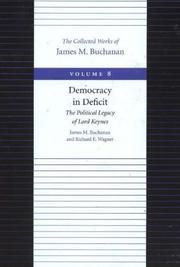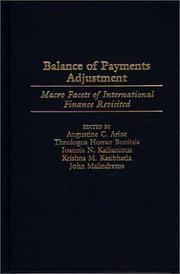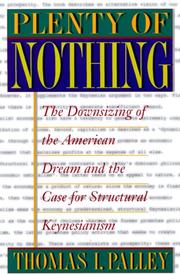| Listing 1 - 6 of 6 |
Sort by
|

ISBN: 0199242046 9780199242047 Year: 2000 Publisher: Oxford : Oxford university press,
Abstract | Keywords | Export | Availability | Bookmark
 Loading...
Loading...Choose an application
- Reference Manager
- EndNote
- RefWorks (Direct export to RefWorks)
Macroeconomics --- Econometrics --- Keynesian economics --- Econometrics. --- Keynesian economics. --- Macroeconomics.

ISBN: 0865972273 0865972281 Year: 2000 Publisher: Indianapolis Liberty Fund
Abstract | Keywords | Export | Availability | Bookmark
 Loading...
Loading...Choose an application
- Reference Manager
- EndNote
- RefWorks (Direct export to RefWorks)
Keynes, John Maynard --- Fiscal policy --- Keynesian economics. --- -Keynesian economics --- 330.97309 --- Post-Keynesian economics --- Schools of economics --- Tax policy --- Taxation --- Economic policy --- Finance, Public --- Government policy --- United States --- Economic policy. --- Keynesian economics

ISBN: 033375137X Year: 2000 Publisher: Houndmills : Macmillan,
Abstract | Keywords | Export | Availability | Bookmark
 Loading...
Loading...Choose an application
- Reference Manager
- EndNote
- RefWorks (Direct export to RefWorks)
Economics --- Keynesian economics --- Social conflict --- History --- History. --- History

ISBN: 0313308268 1567507018 9781567507010 9780313308260 Year: 2000 Publisher: Westport, Conn. : Greenwood Press,
Abstract | Keywords | Export | Availability | Bookmark
 Loading...
Loading...Choose an application
- Reference Manager
- EndNote
- RefWorks (Direct export to RefWorks)
Balance of payments. --- Chicago school of economics. --- Keynesian economics. --- Finance --- Business & Economics --- International Finance --- Monetarism --- Post-Keynesian economics --- Current account balance (International trade) --- International payments, Balance of --- Institutional economics --- Neoclassical school of economics --- Schools of economics --- Foreign exchange --- Terms of trade --- Balance of trade --- International liquidity

ISBN: 0521643511 0511012799 052118018X 0511051913 0511117469 0511492391 0511327765 0511153163 1280153776 1107116627 9780511012792 051103668X 9780511036682 9780511117466 9780511492396 9781280153778 9786610153770 6610153779 9780521643511 9780511051913 9781107116627 9780511153167 9780511327766 9780521180184 Year: 2000 Publisher: Cambridge : Cambridge University Press,
Abstract | Keywords | Export | Availability | Bookmark
 Loading...
Loading...Choose an application
- Reference Manager
- EndNote
- RefWorks (Direct export to RefWorks)
Originally published in 2000, this book is in the tradition of non-market-clearing approaches to macrodynamic approaches. It builds a series of integrated disequilibrium growth models of increasing complexity, which display the economic interaction between households, firms and government across labour, goods, money, bonds and equities markets. Chiarella and Flaschel demonstrate how macrodynamics can be developed in a hierarchical way from economically simple structures to more advanced ones. In addition it investigates complex macrodynamic feedback mechanisms.
Monetary policy. --- Finance --- Business & Economics --- Money --- Keynesian economics. --- Macroeconomics. --- Business, Economy and Management --- Economics --- AA / International- internationaal --- 338.8 --- 331.031 --- 330.3 --- 333.403 --- Economische groei. --- Louter monetaire theorieën i.v.m. conjunctuurschommelingen. --- Methode in staathuishoudkunde. Statische, dynamische economie. Modellen. Experimental economics. --- Monetaire theorieën. Kwantitatieve theorie. Theorie van de incasso's. Optiek van de uitgaven en inkomens. --- Post-Keynesian economics --- Monetary management --- Schools of economics --- Economic policy --- Currency boards --- Money supply --- Keynesian economics --- Macroeconomics --- Monetary policy --- Methode in staathuishoudkunde. Statische, dynamische economie. Modellen. Experimental economics --- Louter monetaire theorieën i.v.m. conjunctuurschommelingen --- Monetaire theorieën. Kwantitatieve theorie. Theorie van de incasso's. Optiek van de uitgaven en inkomens --- Economische groei

ISBN: 0691050317 0691227608 Year: 2000 Publisher: Princeton, N.J. : Princeton University Press,
Abstract | Keywords | Export | Availability | Bookmark
 Loading...
Loading...Choose an application
- Reference Manager
- EndNote
- RefWorks (Direct export to RefWorks)
Business papers today are in a triumphant mood, buoyed by a conviction that the economic stagnation of the last quarter century has vanished in favor of a new age of robust growth. But if we are doing so well, many ask, why does it feel like we are working harder for less? Why, despite economic growth, does inequality between rich and poor keep rising? In this wide-ranging and provocative book, Thomas Palley pulls together many threads of "new liberal" economic thought to offer detailed answers to these pressing questions. And he proposes a new economic model--structural Keynesianism--that he argues would return America to sustainable, fairly shared prosperity. The key, he writes, is to abandon the myth of a natural competitive economy, which has justified unleashing capital and attacking unions. This has resulted in an economy dominated by business. Palley's book, which began as a cover article for The Atlantic Monthly in 1996, challenges the economic orthodoxies of the political right and center, popularized by such economists as Milton Friedman and Paul Krugman. He marshals a powerful array of economic facts and arguments to show that the interests of working families have gradually been sacrificed to those of corporations. Expanding on traditional Keynesian economics, he argues that, although capitalism is the most productive system ever devised, it also tends to generate deep economic inequalities and encourage the pursuit of profit at the expense of all else. He challenges fatalists who say we can do nothing about this--that economic insecurity and stagnant wages are the inevitable results of irresistible globalization. Palley argues that capitalism comes in a range of forms and that government can and should shape it from a "mean street" system into a "main street" system through monetary, fiscal, trade, and regulatory policies that promote widespread prosperity. Plenty of Nothing offers a compelling alternative to conventional economic wisdom. The book is clearly and powerfully written and will provoke debate among economists and the general public about the most stubborn problems in the American economy.
Keynesian economics. --- United States --- Economic policy --- Economic conditions --- Anderson, A. --- Aschauer, D. A. --- Bensinger, Richard. --- Bronfenbrenner, Kate. --- Bush administration: fiscal policy. --- Cold War. --- Corrigan, E. Gerald. --- Eisner, Robert. --- Eurodollar market. --- Federal Reserve Reform Act (1977). --- Fisher, Irving. --- Friedman, Milton. --- Friedman, Rose. --- Galbraith, John Kenneth. --- Gordon, D. M. --- Greenspan, Alan. --- Heilbroner, Robert. --- Howell, D.R. --- International Monetary Fund (IMF). --- Keynes, John Maynard. --- Mexican peso crisis (1995). --- Minsky, Hyman. --- Palley, Thomas I. --- Phelps, Edmund. --- Schor, Juliet. --- balance-of-power hypothesis. --- bankruptcy. --- bureaucratic-failure theory. --- capacity utilization: levels (1948-95). --- capitalism: Cold War victory of utopian. --- chief executive officer (CEO) pay. --- communism. --- comparative advantage. --- competition: for jobs. --- consumption-binge hypothesis. --- debt, household. --- demand: effect of deficient. --- deregulation: effect of. --- economic performance: of median family. --- economic theory: antilabor. --- employment cost index (ECI). --- exploitation. --- fatalism, economic. --- individualism, laissez-faire. --- insecurity, worker. --- investment diversion. --- job loss rates. --- labor standards, core. --- law of one price. --- lower class increase (1973-90). --- monetarists. --- oil shocks, post-1973 effect. --- product market competition. --- recession: 1990.
| Listing 1 - 6 of 6 |
Sort by
|

 Search
Search Feedback
Feedback About
About Help
Help News
News